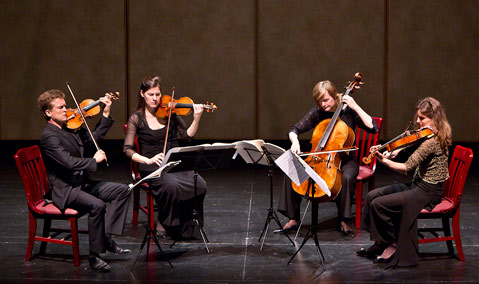Tetzlaff Quartet at the Lobero on Tuesday, April 12
The Tetzlaff Quartet Played Works by Haydn, Mendelssohn, and Schönberg

When the Tetzlaff Quartet took the stage on Tuesday night, an unseen presence seemed to haunt the Lobero: the spirit of Beethoven. The Quartet—violinists Christian Tetzlaff and Elisabeth Kufferath, violist Hanna Weinmeister, and cellist Tanja Tetzlaff—chose a fascinating trio of works by Haydn, Mendelssohn, and Schönberg with strong connections to Beethoven’s late string quartets. Their performance emphasized this complicated string of influences—from Haydn, the elder statesman, to Mendelssohn, Beethoven’s younger contemporary, to Schönberg, the modernist master—resulting in an experience that was both intensely intellectual and deeply emotional.
The quartet began, appropriately, with Haydn’s Opus 20, No. 3 in G minor, one of several quartets that transformed the entire genre by demonstrating its potential for the exploration of serious musical ideas. The Tetzlaff Quartet gave it the seriousness it deserved, along with just enough of Haydn’s humor and grace to make it a joy to hear. They followed with Mendelssohn’s Opus 13 in A minor, and, after the intermission, finished with Schönberg’s Opus 7 in D minor. Both of these astonishing works interpret and assimilate Beethoven’s innovations in original ways, and the Tetzlaff Quartet’s performance demonstrated a deep understanding of their composers’ achievements. The quartet deftly balanced Mendelssohn’s incomparable melodies with the piece’s formal complexity; they explored the subtleties of Schönberg’s challenging ideas while keeping his work’s surprisingly emotional center in sharp focus. In all, it was a powerful and memorable experience.



